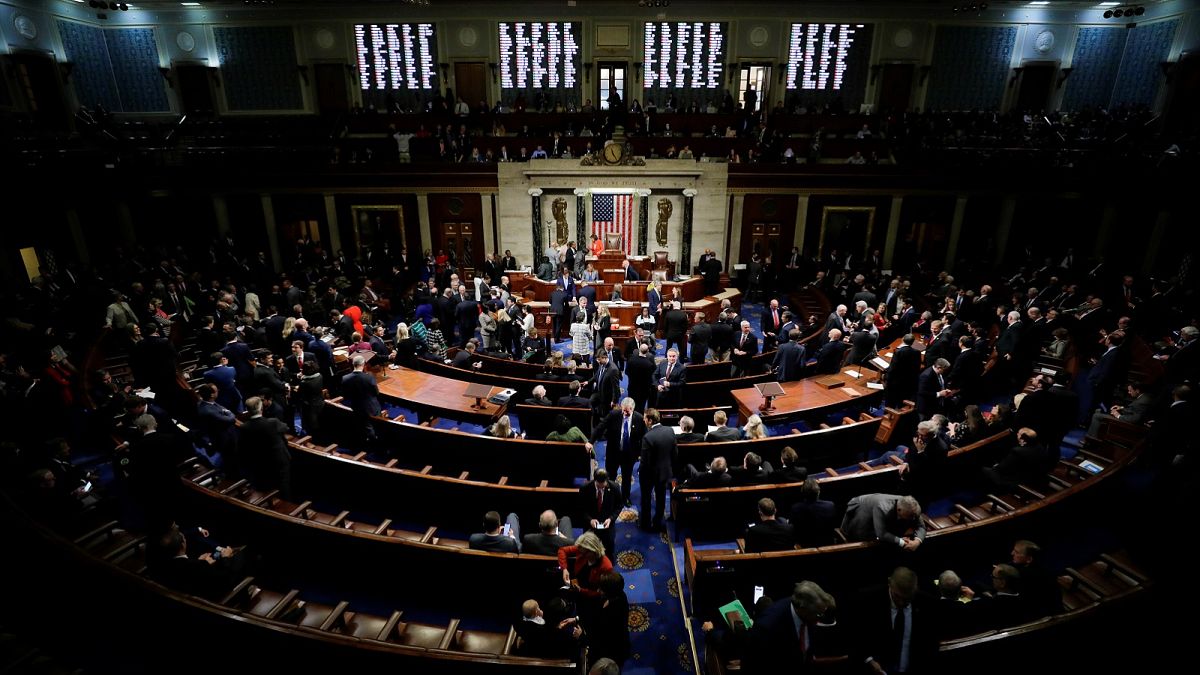For years accused of being "gagged" by Turkey, a resolution adopted overwhelmingly by the US Congress to recognise the Armenian genocide goes beyond reacting to Turkish actions in northern Syria.
Amidst all the ruckus over impeachment, Ukraine and whistleblowers at Congress, the House of Representatives took a landmark decision on Tuesday 29 October, to formally recognise the Armenian Genocide.
Various incarnations of the resolution, which passed overwhelmingly by 405-11, have appeared and been shelved on a number of occasions over the past few decades. Pushed forward by Armenian-American advocacy groups with the support of key representatives and senators, it was always countered by lobbying led by the Turkish government, often with the backing of the State Department or the defence establishment.
Although a majority of scholars have long agreed that the experience of the Armenians and other non-Muslims in the Ottoman Empire during the First World War amounts to genocide, the government of Turkey denies that designation, instead describing the massacres and deportations as general wartime catastrophes during which Muslim populations suffered and died as well.
The brief resolution declares that it is US policy to “commemorate the Armenian Genocide through official recognition and remembrance,” “reject efforts to enlist, engage, or otherwise associate the United States Government with denial of the Armenian Genocide or any other genocide,” and “encourage education and public understanding of the facts of the Armenian Genocide, including the United States role in the humanitarian relief effort, and the relevance of the Armenian Genocide to modern-day crimes against humanity.”
Alongside some individual dissenting voices on politicising and weaponising what should be a solemn recognition, and concerns about the backlash from Ankara given that the resolution was passed back-to-back with a bill for sanctions against Turkey, Armenian-American groups and the government of the Republic of Armenia were quick to express their appreciation. Aram Hamparian of the Armenian National Committee of America welcomed the vote “overriding the longest-lasting foreign veto in American history – Ankara’s gag-rule against honest American remembrance of the Armenian Genocide.”
In addition, Bryan Ardouny of the Armenian Assembly of America said that it “reflects the best of America.” Armenia’s Prime Minister Nikol Pashinyan, for his part, hailed the resolution as “a bold step towards serving truth and historical justice that also offers comfort to millions of descendants of … Armenian Genocide survivors.”
The government of Turkey, on the other hand, did not waste time in condemning the passage of the resolution. President Erdoğan dismissed the vote, adding that “The countries who have stains of genocide, slavery, colonialism in their history have no right to give lessons to Turkey.” The Turkish Foreign Ministry, meanwhile, described the resolution as “drafted and issued for domestic consumption” and “devoid of any historical or legal basis,” “totally null and void.” A visit this month by Erdoğan to Washington may be cancelled as a result of the vote, among other objections.
The measure by the House of Representatives comes in the context of a US-Turkish relationship that has been generally deteriorating for several years. Disputes between the two countries range from controversial imprisonments and extradition demands to corruption schemes, and, most significantly, the move by the Turkish government to purchase a Russian-manufactured anti-aircraft system in contravention of NATO standards, as well as the ongoing Turkish incursion into north-eastern Syria, itself made possible by the sudden US withdrawal from the area.
Although this vote has been described as historic and unprecedented, such resolutions had in fact been adopted by Congress twice before in 1975 and in 1984. Those decisions came about in the wake of the Turkish invasion of Cyprus and its tenth anniversary.
So, even though the solemn remembrance of innocent victims of genocide and reflections on human rights do form identifiable components of the resolution, it is reasonable to conclude that the spur to have such a Congressional measure – with no obstruction by the executive – is similar to what happened in the past: a response to unwelcome Turkish military adventures.
An identical resolution could come up in the Senate. This is the next push being made by the Armenian National Committee of America and the Armenian Assembly of America as their short-term objective.
In the longer term, however, the challenge for the Armenian-American advocacy community is to generate a common and enduring foreign policy cause in Washington. The goal is to maintain regular acknowledgement, condemnation, and public commemoration of the Armenian Genocide as a human rights issue and as a way to inform foreign policy in general, with both the legislative and executive branches of the US government on board.
That is an immense undertaking. Even with decades of experience behind them in Washington DC, Armenian-American groups remain at loggerheads with counter-lobbyists led by the Turkish government and Turkish-affiliated individuals and groups often with greater resources at their disposal.
Still, this latest Congressional measure has more than merely symbolic value. It contains very clear language which can be invoked in order to formulate policy or in order to argue against statements by public officials which run counter to the spirit of the resolution. What transpired in the House of Representatives last week may indeed be a one-time phenomenon, or it may herald the first step in a new beginning.
- Nareg Seferian is a doctoral student at Virginia Tech’s School of Public and International Affairs
____________
Are you a recognised expert in your field? At Euronews, we believe all views matter. Contact us at view@euronews.com to send pitches or submissions and be part of the conversation.


